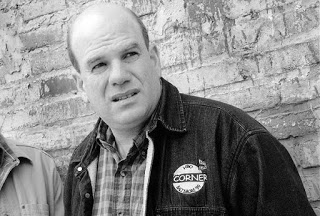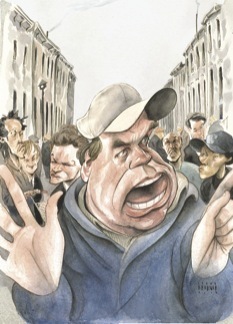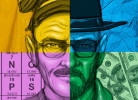 Based on my recent blog post touting HBO’s television programming, it’s safe to say that I have become devotee of The Wire, a stunning, five-season long portrait of a city in decay. It may be second only to Deadwood as the best television HBO has to offer — and maybe that anyone has to offer. Television writing just doesn’t get any better.
Based on my recent blog post touting HBO’s television programming, it’s safe to say that I have become devotee of The Wire, a stunning, five-season long portrait of a city in decay. It may be second only to Deadwood as the best television HBO has to offer — and maybe that anyone has to offer. Television writing just doesn’t get any better.
So as I am prone to do when I become heavily invested in something, after watching I immediately sought out interviews with David Simon, creator of The Wire and the Lead Brain behind the brains that brought the world this phenomenal show.
What I found was a fascinating man who is intelligent, articulate, cynical, and angry. If you’ve been a fan of The Wire but haven’t seen much of the man from which it sprang, I urge you to check out some of these links. I don’t necessarily agree with his worldview, but it’s certainly thought-provoking stuff worthy of a debate.
For instance, Simon says that you — yes, YOU — have little value in our world:
in this postmodern world of ours, human beings—all of us—are worth less. We’re worth less every day, despite the fact that some of us are achieving more and more. It’s the triumph of capitalism. Whether you’re a corner boy in West Baltimore, or a cop who knows his beat, or an Eastern European brought here for sex, your life is worth less. It’s the triumph of capitalism over human value. This country has embraced the idea that this is a viable domestic policy.
That’s from this Slate interview and was featured in an excellent profile in The Atlantic called The Angriest Man in Television. And damn if it isn’t bleak. It paints a picture not just of a man who gave us one of the most scathing (and I would argue important) dramas in television history, but when coupled with his many other interviews it shows a near bitter obsession with shouting the loudest “I told you so”s in the world.
You see, Simon says that The Wire was a show about “the decline of the American empire.” A lofty claim indeed. Ambitious? Certainly. Pompous? Arguably. But then, arrogance and ambition are often intertwined, and the merging of the two can be an essential ingredient in greatness. See also, Alfred Hitchcock.
Such traits just as often turn men into puzzles.
In the Slate interview, Simon declares, “I don’t consider myself to be a crusader of any sort.” Yet one wonders how he can say that with a straight face. The Wire is, among other things, a scathing indictment of the war on drugs. A five-year crusade to show that our mammoth anti-drug bureaucracy just doesn’t work. Simon himself acknowledges this.
As Nancy Scola says in a piece at the Huffington Post, “Season five finds David Simon fed up the world.” And he wants us to know it, exposing the ugly side of the news business, how things work in town hall, and how and why public policy is prioritized. (It would not stun you to know that in the world of The Wire — and in the real world — an issue’s political consequences are among the most important factors in creating public policy, maybe THE most important.)
It’s hard to say he’s not a crusader when huge swaths of the show’s fifth season were devoted to skewering his old bosses at the Baltimore Sun. The newspaper storyline we see was lifted directly from his personal experience. Is what we see accurate? His old bosses called the storyline “dishonest efforts to revise history” and called Simon “a very angry guy.” One almost gets the sense that David Simon is looking to reinvigorate old arguments.
And when it comes to the show, Simon doesn’t deny that he wants an argument. He told The City Paper of Baltimore, “I think that, in a perverse way, I’ve always regarded storytelling as a means of positing an argument that is political in nature.”
But telling a story just to hold the floor and entertain the folks at home feels, I dunno, insubstantial to me. HBO gave us 60 hours. The least I could do for viewers was give them an argument about the world we live in. I might be wrong. I might be ridiculous in my arguments even. But I did some reporting and I’ve watched some things happen and I’ve read a little bit, and so have the other fellows writing this show. And now, we’re going to use drama for the same purpose that some guys write op-ed pieces or editorials.
He’s not merely looking to entertain, he’s looking to provoke. To inform and enlighten, yes, but especially to incite a dialogue, even if that dialogue is heated. ESPECIALLY if it’s heated.
Of course, that is what made The Wire such a powerful show. I don’t agree with all of his conclusions about people, about institutions, and about America in general. I think he’s too cynical (and I say that as a cynic) and completely wrote genuinely good, ordinary people out of his world. And I’m sure he thinks that’s okay, as long as his show got me thinking about these issues.
And it sure did.








Pingback: Why did I stop reading books? – ERIC SAN JUAN
Pingback: Re-Watching the Sopranos – Season 1 – ERIC SAN JUAN